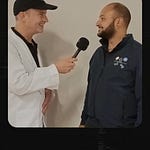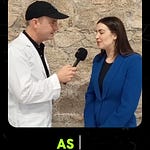John McGowan – Educator – Coder – Entrepreneur
Career Profile
John McGowan, product developer, is CEO of Automagical Apps – where he manages and scales app products which make people’s lives easier. John was a maths teacher for 15 years, and after creating a product for himself to help edit equations with his students, he ‘accidentally’ made his first stab into entrepreneurship. G(Math) went viral and acquired around 15 million users at its peak.
An Accidental Product Developer
After his success, John started to face the problem of teaching full time whilst fully supporting his product. He realised ‘everything I love about being a maths teacher is what I love about entrepreneurship – the problem solving and how to find a creative solution or multiple solutions and sort out which ones are the best’. John made the leap to full time entrepreneurship and has been hugely successful since as a product developer. He sold his first product and now tends to his other apps at automaticalapps.com.
Conor from Self Makers chatted to John about his entrepreneurial journey as a product developer and going through unexpected career change. Check out his great advice.
Taking the leap
“The tipping point for me was being like, ‘this is the thing that I really want to do.’ If I could [I would] bottle up that feeling for entrepreneurs – just to taste that little bit of success. It just really keeps you going.”
Problem Solving as a Product Developer
“Whenever somebody would say ‘can you build this feature?’, I would just go and Google search for it and try to figure out how to do that. Then really the hard part was figuring out ‘which question do I need to ask to find out the answer to this?’ And it really became an aspect of applying those skills and problem solving to really figure out how to solve this problem. So I learned all that coding from the internet for the most part, which is astounding.”
Taking feedback
“As my teaching evolved, it really made it easier for me to become a better product manager in a sense. I would be willing to listen to the feedback critically because the first time I would get someone saying ‘I hate your product’, it was horrible. But then I realised that they were caring enough to give me feedback. So I had to put aside my personal feelings, and then act on that. And so to really see every piece of feedback as critical, even if it was the ones that made me cringe or take a breath before and really see what they’re trying to communicate to me.”
Don’t be afraid to adapt
“I think the other biggest piece of advice I learned there was don’t be afraid to change your plan. Because I had millions of free users who are happy customers, and then I needed to turn them into paying. And I was surprised. I thought everybody would be upset, but I was surprised to see how many people were willing to buy a subscription because they love the product. They were saying ‘thank you, I loved your product. Thank you for letting me pay for it.’ Which was a shock to my system.”
Believing in yourself
“I think the biggest difficulty for me was the imposter syndrome of ‘I’m sure somebody else will be building that. I’m sure somebody else will do that. Why should I?’. So it was taking that first step of ‘well, I’m gonna do that’.
What makes a good chrome extension?
“You have to really thread the needle that if you build something that is too useful then a bigger company might come along and do that. Like Google, for instance, might say, ‘Hey, that’s a great feature. We’re going to incorporate that into a native feature in Google Chrome’ – for example, screen recording.
So I think, how you defend against that is get a really rabid user base that loves your product. Then they give you that feedback so you can stay more nimble and fast, and then you can become that brand standard.”
Inspiration and podcasts
“A big inspiration for me was Sean Gallagher. He has a book ‘Secrets of Success’ where he took a lot of his articles that he had written and put them into a book format. And so that was nice because they’re all success stories of companies.
Some weekly podcasts I like are – the NPR in the US has one that’s called ‘How I Built This’. That is a great one because they’ll take companies that had success and they go through that process. And a lot of times those stories there’s some failure points. You can see how they overcame something.”













Share this post